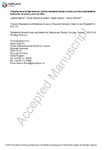Palmitate-induced impairment of glucose-stimulated insulin secretion precedes mitochondrial dysfunction in mouse pancreatic islets
| dc.contributor.author | Barlow, J | |
| dc.contributor.author | Jensen, VH | |
| dc.contributor.author | Jastroch, M | |
| dc.contributor.author | Affourtit, C | |
| dc.date.accessioned | 2016-01-26T18:00:54Z | |
| dc.date.available | 2016-01-26T18:00:54Z | |
| dc.date.issued | 2016-02-09 | |
| dc.identifier.issn | 0264-6021 | |
| dc.identifier.issn | 1470-8728 | |
| dc.identifier.uri | http://hdl.handle.net/10026.1/4235 | |
| dc.description.abstract |
<jats:p>It has been well established that excessive levels of glucose and palmitate lower glucose-stimulated insulin secretion (GSIS) by pancreatic β-cells. This β-cell ‘glucolipotoxicity’ is possibly mediated by mitochondrial dysfunction, but involvement of bioenergetic failure in the pathological mechanism is the subject of ongoing debate. We show in the present study that increased palmitate levels impair GSIS before altering mitochondrial function. We demonstrate that GSIS defects arise from increased insulin release under basal conditions in addition to decreased insulin secretion under glucose-stimulatory conditions. Real-time respiratory analysis of intact mouse pancreatic islets reveals that mitochondrial ATP synthesis is not involved in the mechanism by which basal insulin is elevated. Equally, mitochondrial lipid oxidation and production of reactive oxygen species (ROS) do not contribute to increased basal insulin secretion. Palmitate does not affect KCl-induced insulin release at a basal or stimulatory glucose level, but elevated basal insulin release is attenuated by palmitoleate and associates with increased intracellular calcium. These findings deepen our understanding of β-cell glucolipotoxicity and reveal that palmitate-induced GSIS impairment is disconnected from mitochondrial dysfunction, a notion that is important when targeting β-cells for the treatment of diabetes and when assessing islet function in human transplants.</jats:p> | |
| dc.format.extent | 487-496 | |
| dc.format.medium | Print-Electronic | |
| dc.language | en | |
| dc.language.iso | en | |
| dc.publisher | Portland Press | |
| dc.subject | glucolipotoxicity | |
| dc.subject | mitochondria | |
| dc.subject | obesity | |
| dc.subject | oxidative phosphorylation | |
| dc.subject | pancreatic beta-cells | |
| dc.subject | Type 2 diabetes | |
| dc.title | Palmitate-induced impairment of glucose-stimulated insulin secretion precedes mitochondrial dysfunction in mouse pancreatic islets | |
| dc.type | journal-article | |
| dc.type | Article | |
| plymouth.author-url | https://www.ncbi.nlm.nih.gov/pubmed/26621874 | |
| plymouth.issue | 4 | |
| plymouth.volume | 473 | |
| plymouth.publication-status | Published | |
| plymouth.journal | Biochemical Journal | |
| dc.identifier.doi | 10.1042/BJ20151080 | |
| plymouth.organisational-group | /Plymouth | |
| plymouth.organisational-group | /Plymouth/Faculty of Health | |
| plymouth.organisational-group | /Plymouth/Faculty of Health/School of Biomedical Sciences | |
| plymouth.organisational-group | /Plymouth/REF 2021 Researchers by UoA | |
| plymouth.organisational-group | /Plymouth/REF 2021 Researchers by UoA/UoA01 Clinical Medicine | |
| plymouth.organisational-group | /Plymouth/Research Groups | |
| plymouth.organisational-group | /Plymouth/Research Groups/Institute of Translational and Stratified Medicine (ITSMED) | |
| plymouth.organisational-group | /Plymouth/Research Groups/Institute of Translational and Stratified Medicine (ITSMED)/CBR | |
| plymouth.organisational-group | /Plymouth/Users by role | |
| plymouth.organisational-group | /Plymouth/Users by role/Academics | |
| dc.publisher.place | England | |
| dcterms.dateAccepted | 2015-11-30 | |
| dc.rights.embargodate | 2017-02-09 | |
| dc.identifier.eissn | 1470-8728 | |
| dc.rights.embargoperiod | 12 months | |
| rioxxterms.versionofrecord | 10.1042/BJ20151080 | |
| rioxxterms.licenseref.uri | http://www.rioxx.net/licenses/under-embargo-all-rights-reserved | |
| rioxxterms.licenseref.startdate | 2016-02-09 | |
| rioxxterms.type | Journal Article/Review | |
| plymouth.funder | Why do pancreatic beta cells waste energy?::MRC |


